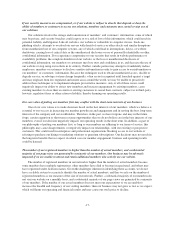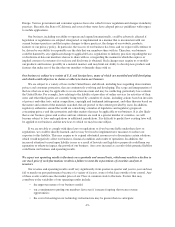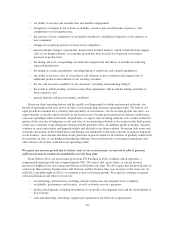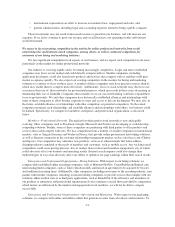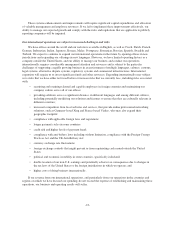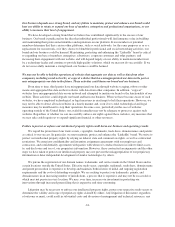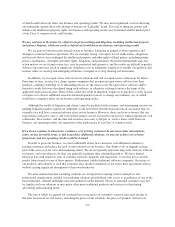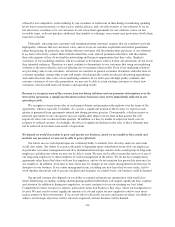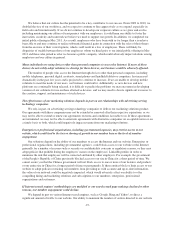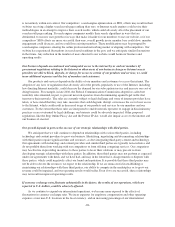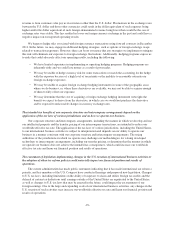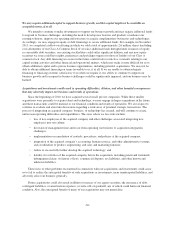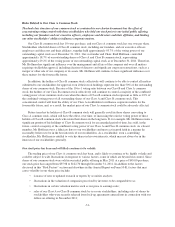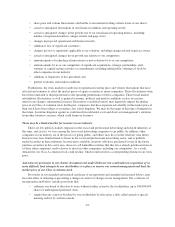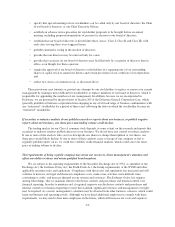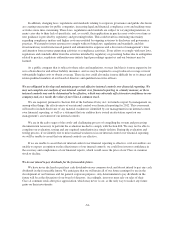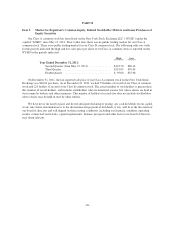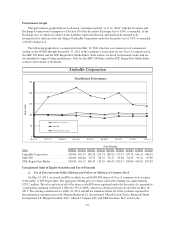LinkedIn 2011 Annual Report Download - page 31
Download and view the complete annual report
Please find page 31 of the 2011 LinkedIn annual report below. You can navigate through the pages in the report by either clicking on the pages listed below, or by using the keyword search tool below to find specific information within the annual report.We believe that our culture has the potential to be a key contributor to our success. From 2009 to 2010, we
doubled the size of our workforce, and we expect to continue to hire aggressively as we expand, especially in
field sales and internationally. If we do not continue to develop our corporate culture as we grow and evolve,
including maintaining our culture of transparency with our employees, it could harm our ability to foster the
innovation, creativity and teamwork we believe we need to support our growth. In addition, we completed our
initial public offering in May 2011. As a result, employees who have been with us for longer than a year have
been able to and may continue to realize substantial financial gains in connection with the sales of their shares
from the exercise of their vested options, which could result in a loss of employees. There will likely be
disparities of wealth between those of our employees whom we hired prior to our initial public offering in May
2011 and those who joined us after we became a public company, which could adversely impact relations among
employees and our culture in general.
Many individuals are using devices other than personal computers to access the Internet. If users of these
devices do not widely adopt solutions we develop for these devices, our business could be adversely affected.
The number of people who access the Internet through devices other than personal computers, including
mobile telephones, personal digital assistants, smart phones and handheld tablets or computers, has increased
dramatically in the past few years and is projected to continue to increase. If we are unable to develop mobile
solutions to meet the needs of our users, our business could suffer. Additionally, as new devices and new
platforms are continually being released, it is difficult to predict the problems we may encounter in developing
versions of our solutions for use on these alternative devices, and we may need to devote significant resources to
the creation, support, and maintenance of such devices.
The effectiveness of our marketing solutions depends in part on our relationships with advertising serving
technology companies.
We rely, in part, on advertising serving technology companies to deliver our marketing solutions product.
Our agreements with these companies may not be extended or renewed after their respective expirations, or we
may not be able to extend or renew our agreements on terms and conditions favorable to us. If these agreements
are terminated, we may not be able to enter into agreements with alternative companies on acceptable terms or on
a timely basis or both, which could negatively impact revenue from our marketing solutions.
Enterprises or professional organizations, including governmental agencies, may restrict access to our
website, which could lead to the loss or slowing of growth in our member base or the level of member
engagement.
Our solutions depend on the ability of our members to access the Internet and our website. Enterprises or
professional organizations, including governmental agencies, could block access to our website or the Internet
generally for a number of reasons such as security or confidentiality concerns or regulatory reasons, or they may
adopt policies that prohibit listing the employers’ names on the employees’ LinkedIn profiles in order to
minimize the risk that employees will be contacted and hired by other employers. For example, the government
of the People’s Republic of China previously blocked access to our site in China for a short period of time. We
cannot assure you that the Chinese government will not block access to one or more of our features and products
or our entire site in China for a longer period of time or permanently. If these entities block or limit access to our
website or adopt policies restricting our members from providing us with accurate and up-to-date information,
the value of our network could be negatively impacted, which would adversely affect our ability to offer
compelling hiring and marketing solutions and subscriptions to our members, enterprises, professional
organizations and customers.
If Internet search engines’ methodologies are modified or our search result page rankings decline for other
reasons, our member engagement could decline.
We depend in part on various Internet search engines, such as Google, Bing and Yahoo!, to direct a
significant amount of traffic to our website. Our ability to maintain the number of visitors directed to our website
-27-


